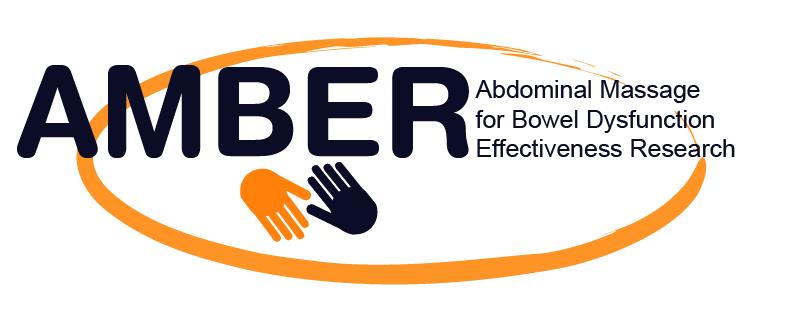
Neurogenic bowel dysfunction (NBD: constipation and/or faecal incontinence) is common in people with multiple sclerosis (MS) and is rated as the most severe impact of their disease/injury, above wheelchair dependence. Despite this, current treatment options are limited.
AMBER is a multicentre trial involving 10 centres across the UK and is funded by the National Institute for Health Research and aims to find out whether abdominal massage can help improve the symptoms of NBD in these patients. A small study has already shown that it is possible for patients or carers to perform abdominal massage and in some cases this helped the patient with their symptoms. A larger study is now required to confirm the results one way or another. We will measure the results of treatment after 6 and 24 weeks. We are primarily interested in whether patients in the intervention group (receiving optimized bowel care and abdominal massage) have had more of an improvement in their NBD symptoms at 24 weeks after they start the study that the control group (receiving optimized bowel care only). We also want to find out how bad the constipation and bowel symptoms are, how much this affects their life and if they have any problems with their bladder. We will also measure the costs of the treatments and any costs to the patient and their family, and balance these against any benefits of the intervention treatment.
AMBER is led by Doreen McClurg at Glasgow Caledonian University, the recruitment target is 200 patients and recruitment will start in 2015.
Contacts
- Shaun Treweek; streweek@mac.com
Status
CompletedPublications
McClurg, D, Goodman, K, Hagen, S, Harris, F, Treweek, S, Emmanual, A, Norton, C, Coggrave, M, Doran, S, Norrie , J, Donnan, P, Mason, H,Manoukian, S. Abdominal massage for neurogenic bowel dysfunction in people with multiple sclerosis (AMBER — Abdominal Massage for Bowel Dysfunction Effectiveness Research): study protocol for a randomised controlled trial. Trials 2017;18:150.
